What is DevOps?
What is DevOps?
DevOps is an IT best practices methodology that brings developers and operations together to rapidly develop and deliver new software features and services. The DevOps approach enables teams to collaborate and accelerate the development-to-deployment process while continuing to improve:
- Quality
- Security
- Reliability

For DevOps to be effective, you must begin with a culture and mindset of collaboration between developers and operations. This is crucial to its success. It enables increased communication between the two teams and thereby leads to innovation. Working within an organization without boundaries, sets up an integrated environment where you can repeatedly test and improve the software code, and then implement a continuous release schedule to deploy the enhanced software.
Your customers’ satisfaction and user-experience increase because new products and services are delivered quickly and with high quality. By using tools with built-in machine learning and algorithms to perform continuous monitoring and response, tasks (workflows) are automatically triggered without human intervention.
As you collect customers’ feedback and analytics, you can quickly adapt that information into your business planning and future product development. This brings you back full circle to start the DevOps cycle once again. However, this time collaborative development benefits from the knowledge learned and validated from customers, and the beginnings of optimization.
By continuing to follow DevOps methodology, companies emerge with a finely-tuned ecosystem with interacting parts, best practices to streamline development, and established standards to maintain a high level of quality.
Benefits of DevOps
Organizations implementing the DevOps methodology can expect these benefits:
- Higher customer satisfaction, value, and ROI
- Decreased costs for development and operation
- Increased quality and more time for innovation for delivered products and services. According to the 12017 State of DevOps Report, high-performing organizations spent 21% less time on unplanned work and rework, and as a result, were able to spend 44% more time on new work, such as developing new features or code.
- Shorter development cycle (with automation) leading to a faster feedback cycle and quicker time-to-market
- Increased communication and collaboration creating a performance-oriented culture
Security, DevOps, and the Future
Today, security must be ingrained everywhere – in the protocols, the systems, the elements, and in the business surrounding the network. Just securing the network perimeter with firewalls no longer provides adequate network protection. Companies must consider building security earlier into coding, architecture, and pre-production systems. With DevSecOps (Security merged with DevOps), you can use automation to seamlessly build and embed security throughout the DevOps lifecycle without slowing down speed or agility.
According to the 22017 State of DevOps Report, the percentage of people working on DevOps teams has been increasing each year. In 2014, 16% of respondents worked on DevOps teams, and by 2017, the percentage grew to 27%. DevOps is a multi-faceted and constantly evolving methodology. In hybrid and multicloud environments, DevOps will be crucial for data centers underpinning the clouds, transport, IoT (Internet of Things), mobile, and other secure networks. As you consider how to implement DevOps and automation, Juniper Networks can assist you with joining network security, tooling, and policy across the multicloud.
DevOps FAQs
What is the main goal of DevOps?
The primary goal of DevOps is to remove the barriers between development and operations teams, which have traditionally been siloed. DevOps promotes collaboration and integration between these groups throughout the entire software lifecycle to increase both the speed and quality of software development.
What problems does DevOps solve?
Organizations that practice DevOps achieve higher efficiency, quicker time to market, and better mean time to recovery with their software development efforts. They ship software faster and with higher quality and stability, which leads to improvements in customer satisfaction, value, and ROI.
What are DevOps best practices?
The benefits of DevOps are tremendous; however, adopting it usually requires some fundamental organizational changes. Among DevOps best practices are building a collaborative culture, implementing continuous integration and development, adopting agile methodologies, using suitable automation tools, switching to a microservices architecture, and continuous performance monitoring.
Is DevOps an agile methodology?
DevOps can be considered a descendant of agile methodology in that it incorporates its principles and practices. However, agile stops short of operations, placing its emphasis on collaboration between developers and product management. DevOps, on the other hand, focuses on the integration of developers and the operations team. DevOps and agile methodologies aren’t mutually exclusive, though, as they both promote the speed and quality of software development.
What DevOps products does Juniper offer?
Juniper Cloud-Native Contrail Networking (CN2) is a software-defined networking (SDN) platform that automates the creation and management of virtual networks. It delivers infrastructure as code, a DevOps tenet, to achieve software quality at hyperscaler efficiency and speed. It's tested, qualified, and deployed using project Argo-based CN2 with Pipelines, a GitOps and Continuous Integration/Continuous Delivery (CI/CD) model for NetOps to deliver reliability engineering at hyperscaler speed.

